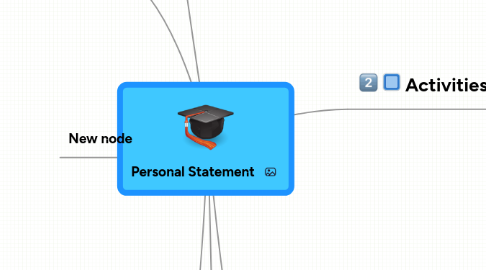
1. Books
1.1. David Smith - Free Lunch
1.1.1. First economics book I read. Learnt about great economists such as Smith, Keynes, Marshall, Marx, Ricardo, Malthus
1.2. John Kay - Everlasting Lightbulbs
1.3. Eric Beinhocker - The Origin of Wealth
1.3.1. New and different approach to economics by applying evolution to it. Showed me how economics is a modern changing field
1.4. Keynes - General Theory
1.4.1. To explore the ideas of perhaps the most important economist in history
1.5. Proudstone - Prisoners Dilemma
1.5.1. Introduced me to Game Theory - a strand of economics I am very interested in
1.6. Rosser - Basic Mathematics for Economists
1.6.1. Showed me how mathematics is applied to economics - something that wasn't in the A-Level course
1.7. Robert Peston - Who Runs Britain?
1.8. Eric Roll - History of Economic Thought
1.9. Tim Harford - The Undercover Economist
1.10. Tim Harford - The Logic of Life
1.11. Rommer - Advanced Macroeconomics
1.12. Beaud and Dostaler - Economic Thought Since Keynes
1.13. Paul Krugman - Return of Depression Economics
1.13.1. The book of one of my favourite economists and Noble prize winners
2. Post Degree
2.1. Postgraduate study
2.1.1. If I enjoy undergraduate economics, would consider doing Masters/PhD in a specialised area of economic that interests me
2.2. Actuarial science
2.2.1. Links mathematics, statistics and economics
2.3. Teaching
2.3.1. To inspire other people about economics
2.4. Accountancy
2.5. Banking
3. Other Personal Skills
3.1. Music
3.1.1. Self taught to play piano.
3.2. Sports
3.2.1. Keen sportsperson. Played in a football team for about 6/7 years, play tennis weekly. Feel I could contribute to universities/college sporting scene
3.3. Theatre
3.3.1. Enjoy acting. For example been in Les Miserables and Lichfield Garrick Youth Theatre
4. Other Economics Media
4.1. Podcasts
4.1.1. LSE Public Lectures - Paul Krugman
4.2. Newspapers
4.2.1. Read the Times daily
4.3. Magazines
4.3.1. The Economist
4.3.2. World Economic Review
5. New node
6. Activities and Skills
6.1. UK Maths Challenge
6.1.1. Done for 6/7 years with bronze, silver or gold award awarded every time
6.2. Open University 'Story of Maths' course
6.2.1. Given me a taste of independent, university level study linking to my fascination with maths and history
6.3. Young Enterprise - Financial Director
6.3.1. Improved my communication, management and financial skills. Able to give me an insight to the running of a firm allowing me to relate it to things like business economics and to criticise the traditional theory of the firm
6.4. Young Economist of the Year Competition
6.4.1. Enjoyed the individual work and research involved in producing an answer to a complex interesting economic question
6.5. IEA Student Essay Competition
6.6. Bank of England Target 2.0 Competition
6.7. NAGTY Imperial College Summer School
6.8. BA Silver CREST awards for Science and Technology
6.9. Economics Blog - 'Rational Economic Man'
6.9.1. Encourages me to form critical views on world news and events to share with the rest of the world
7. Why Economics?
7.1. It interests me
7.1.1. Financial crisis has questioned capitalism and has made the studying of economics more important than ever
7.1.2. Applying mathematics to economics - it forms a framework to make claims, theories and to create models.
7.1.3. Applying history to economics - How economics has shaped history (e.g. French Revolution, Nazis come to power, World Wars) - How history is important for economics (e.g. Looking back at 1929 and 90's Japan to analyse today's crisis
7.1.4. Frustration at A-Level Economics - Lack of mathematics - Little opportunity (at AS) to criticise workings of economics, you have to accept what is written - Multiple choice, structured questions and short time limit meant I wasn't allowed to develop a 'proper' economic argument
7.1.5. Interested in how the environment will affect our economic ideas
7.1.6. In particular I like the broadness of the applications and relevance of economics. That is, one can use economics to analyse everyday problems (as shown by the work of Tim Harford) as well as looking at crucial international issues such as globalisation and climate change
